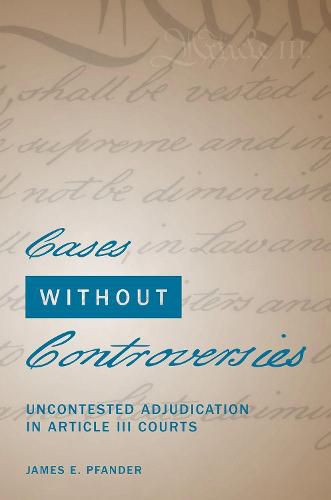Readings Newsletter
Become a Readings Member to make your shopping experience even easier.
Sign in or sign up for free!
You’re not far away from qualifying for FREE standard shipping within Australia
You’ve qualified for FREE standard shipping within Australia
The cart is loading…






This book offers a new account of the power of federal courts in the United States to hear and determine uncontested applications to assert or register a claim of right. Familiar to lawyers in civil law countries as forms of voluntary or non-contentious jurisdiction, these uncontested applications fit uneasily with the commitment to adversary legalism in the United States. Indeed, modern accounts of federal judicial power often urge that the language of the Article III of the U.S. Constitution limits federal courts to the adjudication of concrete disputes between adverse parties, thereby ruling out all forms of non-contentious jurisdiction. Said to rest on the so-called case-or-controversy requirement of Article III, this requirement of party contestation threatens the power of federal courts to conduct a range of familiar proceedings, such as the oversight of bankruptcy proceedings, the issuance of warrants, and the adjudication of applications for mandamus and habeas corpus relief. By recounting the tradition of naturalization and other uncontested litigation in antebellum America and coupling that tradition with an account of the important difference between cases and controversies, this book challenges the prevailing understanding of Article III. In addition to defending the power of federal courts to hear uncontested matters of federal law, the book examines the way the Constitution’s meaning has changed over time and suggests a constructive interpretive methodology that would allow the Supreme Court to take account of the old and the new in defining the contours of federal judicial power.
$9.00 standard shipping within Australia
FREE standard shipping within Australia for orders over $100.00
Express & International shipping calculated at checkout
Stock availability can be subject to change without notice. We recommend calling the shop or contacting our online team to check availability of low stock items. Please see our Shopping Online page for more details.
This book offers a new account of the power of federal courts in the United States to hear and determine uncontested applications to assert or register a claim of right. Familiar to lawyers in civil law countries as forms of voluntary or non-contentious jurisdiction, these uncontested applications fit uneasily with the commitment to adversary legalism in the United States. Indeed, modern accounts of federal judicial power often urge that the language of the Article III of the U.S. Constitution limits federal courts to the adjudication of concrete disputes between adverse parties, thereby ruling out all forms of non-contentious jurisdiction. Said to rest on the so-called case-or-controversy requirement of Article III, this requirement of party contestation threatens the power of federal courts to conduct a range of familiar proceedings, such as the oversight of bankruptcy proceedings, the issuance of warrants, and the adjudication of applications for mandamus and habeas corpus relief. By recounting the tradition of naturalization and other uncontested litigation in antebellum America and coupling that tradition with an account of the important difference between cases and controversies, this book challenges the prevailing understanding of Article III. In addition to defending the power of federal courts to hear uncontested matters of federal law, the book examines the way the Constitution’s meaning has changed over time and suggests a constructive interpretive methodology that would allow the Supreme Court to take account of the old and the new in defining the contours of federal judicial power.